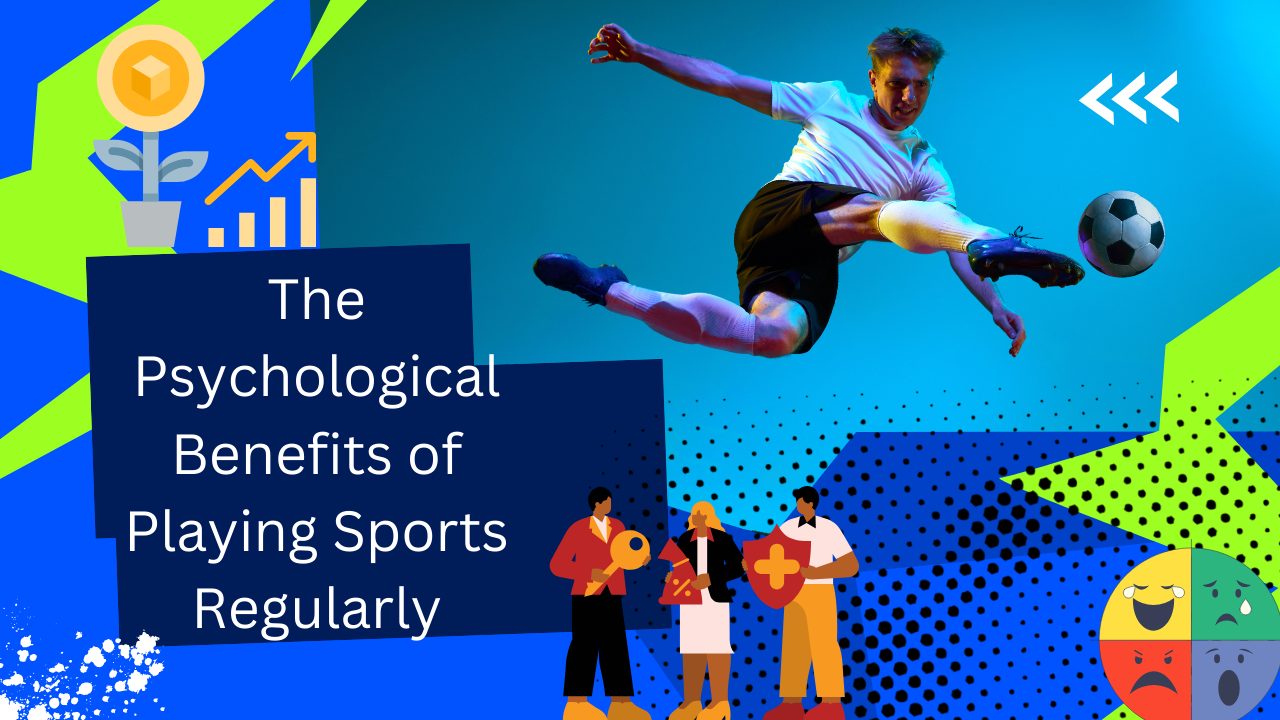Introduction
Imagine standing on a soccer field, heart pounding as you prepare to take the final shot. Your teammates cheer, the adrenaline rushes through your veins, and for a moment, everything else fades away. Sports have an incredible ability to pull us into the present moment, offering not only physical fitness but also immense psychological benefits.
Many people associate sports with building muscles and endurance, but the benefits extend far beyond physical health. Regular participation in sports can significantly improve mental well-being by reducing stress, enhancing self-confidence, improving focus, and even combating depression. Whether it’s an intense basketball match, a relaxing yoga session, or a solo run through nature, sports can profoundly shape our emotions and cognitive abilities.
This article delves into the science-backed psychological benefits of playing sports regularly, explaining how they influence the brain, emotions, and mental resilience.
1. Stress Reduction and Mood Enhancement

The Science Behind Sports and Stress Relief
In today’s fast-paced world, stress has become a common part of life. Work deadlines, financial pressures, and personal responsibilities can all contribute to high stress levels. Engaging in sports is one of the most effective ways to combat stress naturally.
Physical activity stimulates the release of endorphins, often called “happiness hormones,” which help reduce stress and elevate mood. Additionally, sports lower cortisol, the hormone responsible for stress. According to a study published in The Lancet Psychiatry, people who exercise regularly experience 43.2% fewer days of poor mental health compared to those who don’t.
How Different Sports Reduce Stress
- Team Sports (e.g., Soccer, Basketball, Volleyball) – These sports encourage social interaction, which naturally reduces stress by promoting feelings of connection and belonging.
- Individual Sports (e.g., Running, Swimming, Cycling) – These activities allow for self-reflection and mindfulness, helping clear the mind and relieve anxiety.
- Mind-Body Sports (e.g., Yoga, Tai Chi, Martial Arts) – These sports emphasize breathing and relaxation, reducing cortisol and enhancing mental clarity.
2. Boosting Self-Esteem and Confidence
Overcoming Challenges and Building Resilience
Confidence grows when individuals overcome challenges, and sports offer countless opportunities to push personal limits. Whether it’s achieving a personal best in running, mastering a difficult yoga pose, or leading a team to victory, sports instill a sense of accomplishment.
A study from the American Psychological Association (APA) suggests that participating in sports is linked to higher self-esteem, especially in adolescents. This effect extends into adulthood, as individuals continue to develop resilience and confidence through athletic activities.
Real-Life Example: Serena Williams’ Mental Strength
Serena Williams, one of the greatest tennis players of all time, has faced numerous obstacles throughout her career, including injuries and setbacks. Her ability to bounce back from adversity highlights how sports cultivate mental resilience and self-belief.
3. Enhancing Social Skills and Emotional Intelligence
The Role of Teamwork in Emotional Development
Engaging in team sports teaches valuable life skills such as effective communication, leadership, and conflict resolution. These skills are essential not just in sports but in professional and personal relationships as well.

When playing team sports, individuals learn to:
- Communicate effectively – Express ideas clearly and listen to teammates.
- Collaborate towards a common goal – Understand different perspectives and work together.
- Manage emotions – Handle frustration, celebrate wins gracefully, and stay composed under pressure.
Building Meaningful Friendships
Sports foster a sense of community. Whether it’s a weekly basketball match, a running club, or a yoga class, sports provide opportunities to meet new people and build strong social connections, reducing loneliness and isolation.
4. Cognitive Benefits: Sharpening Focus and Memory
How Sports Improve Brain Function
Regular physical activity boosts brain health by increasing blood flow, enhancing neural connectivity, and promoting the release of brain-derived neurotrophic factor (BDNF), a protein that supports cognitive function.
A study by Harvard Medical School found that exercise improves concentration, problem-solving skills, and memory retention. Sports that require strategy and quick decision-making, such as chess-boxing or tennis, are particularly beneficial for cognitive enhancement.
Sports That Challenge the Brain
- Tennis: Requires strategic planning, hand-eye coordination, and quick reflexes.
- Basketball: Enhances decision-making skills under pressure.
- Martial Arts: Improves concentration, discipline, and cognitive control.
5. Sports as a Natural Antidepressant
The Link Between Exercise and Depression
Millions of people worldwide suffer from depression, but regular participation in sports has been shown to be an effective natural remedy. Exercise boosts serotonin and dopamine levels—neurotransmitters responsible for happiness and motivation.
A Harvard T.H. Chan School of Public Health study found that running for just 15 minutes a day or walking for an hour reduces the risk of major depression by 26%. Sports provide structure, routine, and purpose, all of which are essential for managing depression.
Case Study: Michael Phelps’ Battle with Depression
Olympic swimmer Michael Phelps has openly discussed his struggles with depression and how sports helped him cope. Swimming provided him with discipline and a therapeutic outlet for his emotions, demonstrating the profound impact sports can have on mental health.
6. Improved Sleep Quality and Mental Clarity
The Connection Between Sports and Restorative Sleep
Sleep is crucial for mental well-being, and regular exercise helps regulate sleep patterns. The National Sleep Foundation states that people who exercise frequently experience better sleep quality, falling asleep faster and enjoying deeper rest.
Better sleep leads to:
- Improved mood and emotional stability.
- Enhanced memory retention and cognitive function.
- Reduced risk of insomnia and sleep disorders.
Best Sports for Better Sleep
- Low-impact activities (e.g., Swimming, Yoga, Walking): Promote relaxation and ease anxiety.
- Aerobic exercises (e.g., Cycling, Jogging): Reduce sleep onset time and improve sleep duration.
7. Sports as a Tool for Emotional Expression
Channeling Emotions Through Movement
For individuals who struggle to express emotions verbally, sports offer a healthy emotional outlet. Athletes often experience a therapeutic release when engaged in movement, whether it’s celebrating a win, venting frustration, or finding peace through physical activity.
Artistic and Expressive Sports
- Dance and gymnastics: Blend athleticism with creativity and expression.
- Martial arts: Combine discipline and control with self-expression.
- Extreme sports: Provide an adrenaline rush that helps manage stress.
8. Encouraging a Growth Mindset
Learning from Wins and Losses
Sports teach individuals to adopt a growth mindset, which emphasizes learning and effort over innate ability. Athletes understand that setbacks are temporary and that skills can improve with practice and perseverance.
How to Develop a Growth Mindset Through Sports
- Set realistic goals and track progress.
- View mistakes as learning opportunities.
- Stay persistent, even in the face of challenges.
Conclusion
Playing sports is one of the most effective ways to enhance psychological well-being. From reducing stress and boosting confidence to improving cognitive function and sleep quality, sports have far-reaching benefits for mental health.
Whether you’re engaging in team sports, solo activities, or mindfulness-based exercises, the key is consistency. If you’re looking for a natural way to improve your mental health, consider joining a local sports club, picking up a new physical hobby, or simply incorporating movement into your daily routine.
Sports are not just about winning games; they’re about building a healthier, happier, and more resilient mind.
Meta Description:
Discover the psychological benefits of playing sports regularly, from stress relief and enhanced self-confidence to improved cognitive function. Learn how sports can boost mental well-being.
Would you like me to suggest royalty-free images or provide additional references?
https://totalinsights.online/wp-admin/post.php?post=28943&action=editReadmore…

